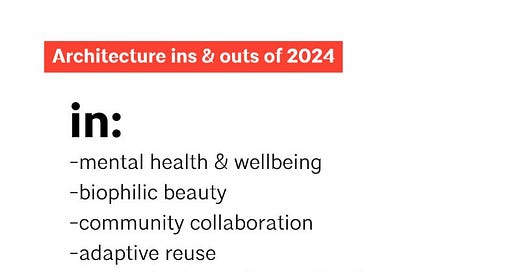On Pay Equity: Part 3 of 3. I'm Black in Historic Preservation (+ Architecture) ...
of course, when I see something, I say something in the name of pay equity
Prefer to listen to this essay instead? Click here and copy and paste the link to this article into the site’s prompt.
Part 3 concludes with an update from AIANY. For continuity of care, I am re-sharing the Disclaimer that preceded Part 1.
Disclaimer from the author: Shaming is not in my toolkit for change. However, it is important to hold people and institutions accountable for their behavior that is a barrier for the change we need for a just and equitable society. With this in mind, while I mentioned members of the New York Chapter of the American Institute of Architects (AIANY) leadership/staff/consultants by title or AIANY, the non-profit, I do so to share my experience as an AIANY member and to tell a fuller story for equity and healing of myself and others.
Even with my attempts not to shame people in telling my story, I realize that some might perceive that I am. This attempt to tell fuller histories about the traumatic lived experiences of Black people, like slavery and redlining, and a more honest (hi)story of the United States in general, is one that people view as shaming White people. However, at some point, for the equitable society that most people want, critical thinking with discernment on whose comfort takes priority in storytelling about the past is key.
As the incident of Nov. 9 is now my second experience of aggression at the official home for architects in New York, the Center for Architecture, I feel it is important to share one of the more egregious experiences as a Black woman in architecture as a teachable moment for AIANY and the profession at large on conflict and post-conflict restoration. Throughout my architecture career and education, I have felt like someone’s or an institution’s teachable moment – and the one I describe in this article might be the biggest one.
Also, the details within are of verbal abuse and trauma that some readers might find difficult to experience. Proceed with care for well-being. Thank you.
AIANY’s Response (con’t)
In November 2023, at the New York City Chapter of the American Institute of Architects’ Civic Leadership Program’s (AIANY CLP) Public Event on Nov. 9, 2023, I co-planned and co-hosted for this program, I asked AIANY to increase its budget to provide: (1) more funding for speaker stipends and (2) to compensate Civic Leadership cohort members for our labor.
The response to date, as of the email dated December 14, 2023, is that AIANY:
(1) will increase the budget for guest speakers that the cohort members invite and
(2) will not compensate cohort members.
The exact response from the email dated Dec. 14, 2023, by AIANY Senior Staff:
Regarding the demands raised at the public event session with our Executive Committee; we are not making changes to the close of the 2023 program, but are working through a review of the materials and plans for the future and will add to those conversations ongoing input from this group, alumni, and Board leadership. We will adjust future budgets to increase the speaker stipends and will continue to seek additional funding for the program. We do not anticipate shifting the program from its structure to become stipendiary or a fellowship. It will continue to be a free learning and development program for the participants, and we are actively evaluating the deliverables/workload issues the cohort raised.
The events on Nov. 9th and subsequent activities delayed the final CLP Public Event and closing activities. This Dec. 14th email was in response to an email from a 2023 AIANY CLP cohort member stating that they would not continue with the second Public Event and closing activities for he 2023 cohort because the time extension was beyond what AIANY stated in the CLP cohort participant contract.
To me and others, the lack of compensation for cohort members supports elitism in the architecture profession -- everyone cannot afford to provide free labor. This situation is especially true for mid-career and emerging architects who, per the AIA's recent survey, "AIA study examines the impact of student debt on profession," published on Nov. 28, 2023, have student loan debt. And yes, I speak from experience: When I graduated in 2010 with two Masters degrees in architecture and urban planning, I had over $90,000.00 in student loan debt.
In the Dec. 14th email, the AIANY Senior Staff’s use of the word “demands” framed me as an aggressive person. In communications with my cohort members, I clarified my preference for the word “request” instead of “demand.” There is a difference between these words. As a social scientist and researcher on the power of grammar and language in history communications, I am aware of the importance of language choices in communications. As a Black woman, I am acutely aware of how others perceive me, even if I am being calm or direct/assertive in my communications. The perception and narrative about me when I ask for what I need to succeed, the definition of equity, is that I am being aggressive.
For reference, a demand implies the withholding of labor or another object of value until the demandor receives what they demand. I never withheld my labor in exchange for AIANY complying with the requests that I outlined in the Call to Action that I presented on Nov. 9, 203, at the Center for Architecture.
In Conclusion …
In 1923, the AIA, the majority White architect club, admitted its first Black member. In 2024, it will gain its first president who is a Black woman. And, in 2024, its largest chapter, AIANY, will gain its first Black president, who shared in his Nov. 28, 2023 email announcement that the 2024 AIANY presidential theme is “Belonging and Beyond” that “centers on a crucial aspect of human well-being that improves physical and social-emotional health and resilience for individuals and communities.” And, in 2024, AIANY lost a Black woman member.
Coincidentally, at the start of 2024, AIA National shared to its social media accounts (Twitter, LinkedIn, and Instagram) a post about what’s “In” and what’s “Out” for architects in 2024. Number one on its list is “mental health & wellbeing.” My wish and others’ wish is for the mental health and well-being of architects to be a collaborative goal supported both within the profession and externally with client collaborators and stakeholders:

Thank you for reading, reflecting, and perhaps taking action on pay equity and well-being in your respective fields.
And, thank you to the publications who did not respond to my submission of this article for publication:
Architect’s Newspaper
New York Times
Madame Architect
Jezebel
Be kind to yourself and others.
k. kennedy Whiters, AIA (she/her), is a New York-based architect, social scientist, published writer, and guest speaker. She is the founder of wrkSHäp | kiloWatt, home to three initiatives she founded to support racial equity: Black in Historic Preservation (BiHP), Beyond Integrity in (X), and (un)Redact the Facts. kennedy has been featured by the Advisory Council of Historic Preservation (ACHP) and on the UK/Canada-based podcast "The Allusionist.”
Black in Historic Preservation (BiHP) is a member-supported publication. To receive new posts and support the longevity of BiHP, consider becoming a paid member:





